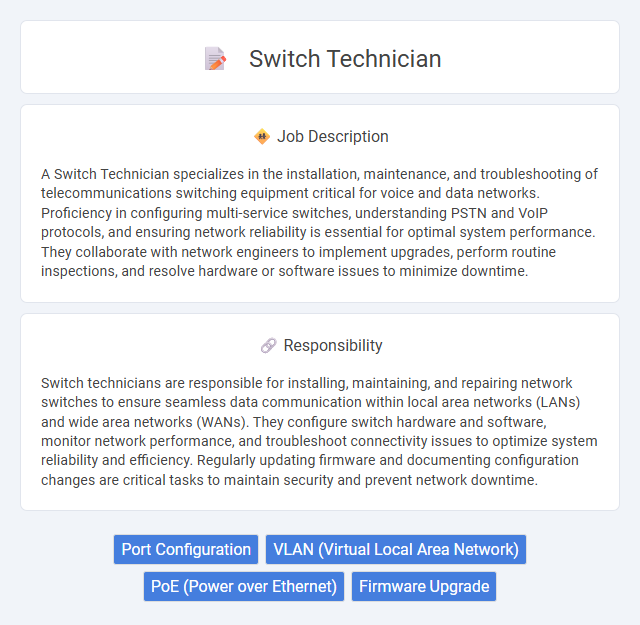
A Switch Technician specializes in the installation, maintenance, and troubleshooting of telecommunications switching equipment critical for voice and data networks. Proficiency in configuring multi-service switches, understanding PSTN and VoIP protocols, and ensuring network reliability is essential for optimal system performance. They collaborate with network engineers to implement upgrades, perform routine inspections, and resolve hardware or software issues to minimize downtime.
Individuals who are detail-oriented and have strong problem-solving skills are more likely to be suitable for a switch technician job. Those comfortable working with complex electrical systems and able to remain calm under pressure may find this role particularly fitting. People who struggle with precision or prefer less technical work might face challenges in this position.
Qualification
Switch technicians require a strong foundation in electrical engineering, telecommunications, or computer networks, often supported by a technical diploma or associate degree. Proficiency in configuring and troubleshooting switch hardware and software, such as Cisco or Juniper systems, is essential. Certifications like CCNA or JNCIA enhance a technician's qualifications and demonstrate expertise in network switching technologies.
Responsibility
Switch technicians are responsible for installing, maintaining, and repairing network switches to ensure seamless data communication within local area networks (LANs) and wide area networks (WANs). They configure switch hardware and software, monitor network performance, and troubleshoot connectivity issues to optimize system reliability and efficiency. Regularly updating firmware and documenting configuration changes are critical tasks to maintain security and prevent network downtime.
Benefit
Switch technicians likely experience benefits such as competitive salaries and opportunities for career advancement in the telecommunications industry. Access to specialized training and certifications may enhance their technical skills and job security. They probably enjoy a dynamic work environment with increasing demand due to the expanding network infrastructure.
Challenge
Switch technician jobs likely involve complex problem-solving challenges requiring a deep understanding of networking hardware and software. These professionals probably face the difficulty of diagnosing and resolving connectivity issues swiftly to minimize downtime. The role may also demand adapting to rapidly evolving technologies, increasing the necessity for continuous learning and technical agility.
Career Advancement
Switch technician roles offer significant career advancement opportunities through specialization in telecommunications systems and network infrastructure. Gaining certifications such as Cisco CCNA or Juniper JNCIA enhances technical expertise, opening pathways to senior technician, network engineer, or systems administrator positions. Continuous skill development in emerging technologies like SDN (Software-Defined Networking) and 5G networks drives career growth and higher earning potential.
Key Terms
Port Configuration
Switch technicians specialize in port configuration, ensuring optimal network performance by assigning correct VLANs, setting port speeds, and enabling necessary protocols. They manage access control lists (ACLs) and implement security measures to prevent unauthorized access on switch ports. Proficiency in configuring trunk and access ports enables seamless communication across different network segments and supports scalable infrastructure.
VLAN (Virtual Local Area Network)
Switch technicians specialize in configuring and managing VLANs (Virtual Local Area Networks) to enhance network segmentation and security. They implement VLAN tagging protocols such as IEEE 802.1Q to efficiently partition networks, reducing broadcast domains and improving traffic management. Expertise in VLAN assignment, trunking, and inter-VLAN routing is essential for maintaining optimized network performance and reliability.
PoE (Power over Ethernet)
Switch technicians specializing in Power over Ethernet (PoE) systems install, configure, and maintain switches that deliver both data and electrical power over a single Ethernet cable, enabling efficient powering of devices such as IP cameras, VoIP phones, and wireless access points. Expert knowledge in PoE standards like IEEE 802.3af, 802.3at, and 802.3bt ensures optimal power management and network reliability. Proficiency in troubleshooting PoE switches and understanding power allocation methods enhances network performance and minimizes downtime in enterprise environments.
Firmware Upgrade
Switch technicians specialize in maintaining network switches by performing critical tasks such as firmware upgrades to enhance device performance and security. Firmware upgrades ensure switches run the latest software versions, patch vulnerabilities, and add new features to support evolving network demands. Expertise in backup configurations, compatibility checks, and rollback procedures is essential for minimizing downtime and ensuring seamless network operations during the upgrade process.
 kuljobs.com
kuljobs.com